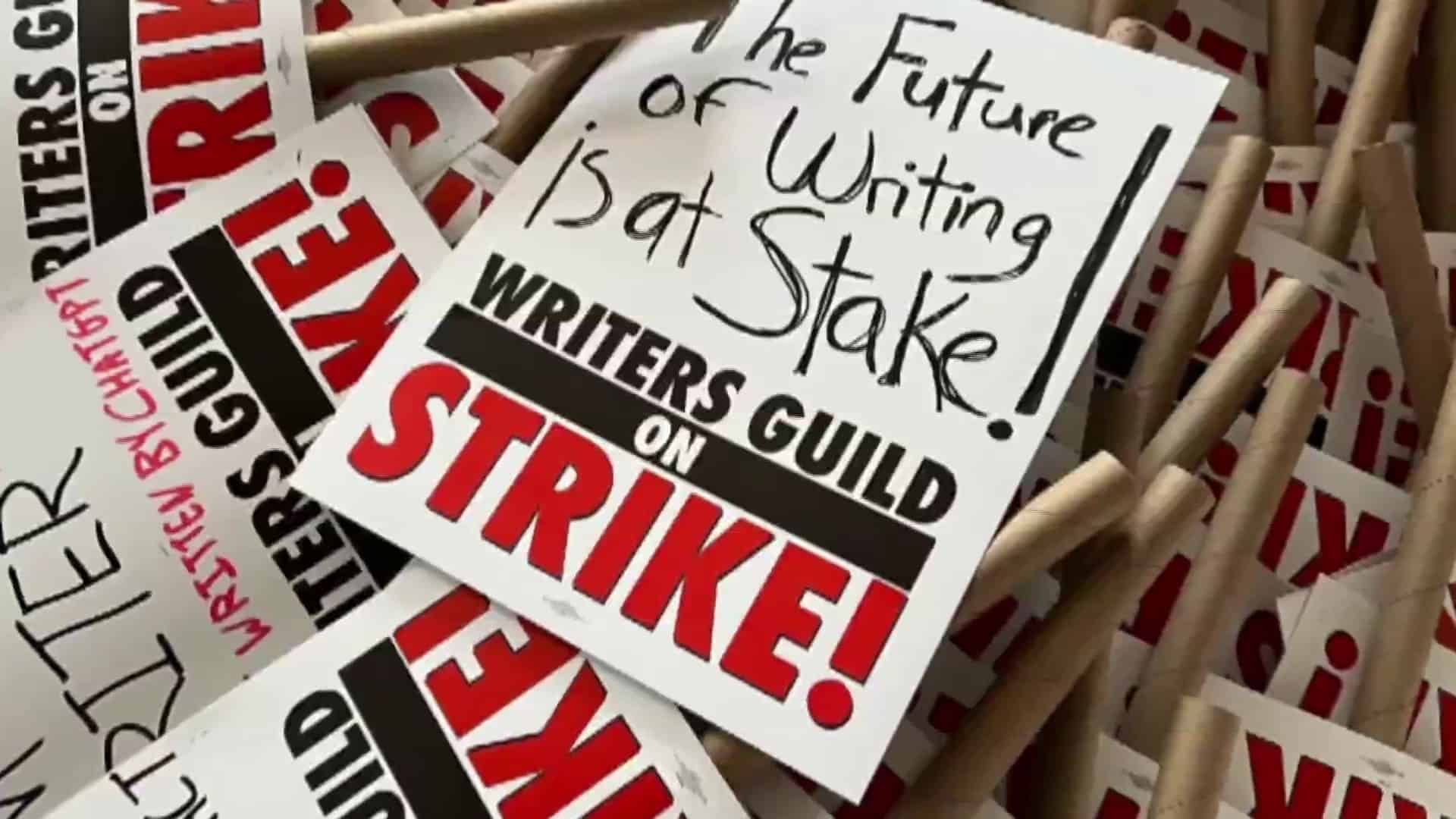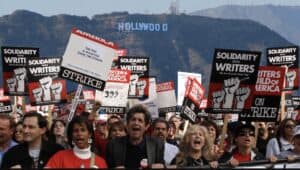So the Hollywood writers strike is on – I always seem to show up at the right place and time. Landing in Los Angeles after my recent round-the-world trip to do workshops on ChatGPT, I find myself at the current epicenter of the clash between writers and AI. Artists and writers are always the canary in the coal mine when it comes to the positive and negative impacts of technology on society.
Of course, the strike by the 11,500-plus members of the Writers Guild of America (WGA) is about more than the impact of artificial intelligence. They are also fighting for wage fairness, minimum staffing requirements, and residual payments that should reflect a show or movie’s performance.
The last time Hollywood saw a strike (2007), it was also the WGA confronting them over the impact of new technology – the issue of royalties from DVD sales. That era has come and gone (remember, Netflix used to mail out DVDs). Now the issues aren’t about content distribution but creation, and Hollywood writers are standing on a faultline created by the content-producing capabilities of AI and ChatGPT.
The current strike has already caused many comedy shows to go off the air, while network television shows have a small cushion before shutting down. However, the writers may have less leverage this time around, as production companies like Netflix now have a backlog of content to use during a strike.
A Strike Over the Value of Human Effort

As soon as generative AI arrived, there were fears it would result in job losses in the professional classes, including office workers and writers. The Writers Guild of America (WGA) felt it had no option but to put the issue on the table. As programmer and AI consultant Dylan Budnick said in Rolling Stone,
The writers are very right to be spooked by this. Studios can save a buck, wrangle creative control away from the writers to please advertisers-funders, and focus on editing a prewritten script instead of dealing with a range of voices and takes from a writers room.
Generative AI has already shown the capability to generate complete scripts. Give it the following prompt, and before you can finish your coffee, you’ll have a 50-page script with stage directions and a soundtrack, which you can refine with follow-up prompts.
Write me a movie about Spider-Man meeting Batman, include stage directions, suggest actors, soundtrack, etc. Write it in the style of a detective noir film.
Studios could even jettison writers and use in-house editors to complete the writing process. Of course, the current products are not Emmy-caliber work; indeed, the content produced by ChatGPT is generic and filled with clichés and tropes. But Hollywood writers can envision a future where they have little to no work.
As Marc Guggenheim, Co-Creator Of “Arrow” And “DC’s Legends Of Tomorrow” said, the issue is not what generative AI can do today but how rapidly it’s improving.
We all have to understand that this is the bad version of ChatGPT. It’s not the better version we’re going to see six months from now. The technology is moving so fast and will move even faster than we can anticipate, and that is why we have got to deal with it in this negotiation.
Actor, writer, and producer Justine Bateman has warned that other professional sectors will see the same battle come to their doors in the near future. For her, the WGA strike is a fight over the “devaluing of human effort, skill, and talent in favor of automation and profits.”
Watch this #WGA strike carefully.
Understand that our fight is the same fight that is coming to your professional sector next: it’s the devaluing of human effort, skill, and talent in favor of automation and profits. @WGAWest @WGAEast #Humanism #AI— Justine Bateman (@JustineBateman) May 2, 2023
Today, it’s the writers in Hollywood – will your job be next?
The Hollywood Writers Strike Demands Over AI
When it comes to the use of AI for writing, the WGA is far apart from the Alliance of Motion Picture and Television Producers (AMPTP), which has only offered “annual meetings to discuss advancements in technology.” But the shift to using AI has been going on for years. As Vox noted,
Consider the use of AI engines to make decisions about greenlighting projects, or the generation of a second Will Smith for the 2019 action movie Gemini Man, in which Smith co-starred opposite a fully computer-generated replica of his younger self — something AI makes very easy. Or consider Avengers: Engdame co-directors Joe and Anthony Russo’s ventures into filmmaking AI, which they believe will be capable of generating scarily narcissistic-sounding entertainment — you get to star in a movie with Marilyn Monroe, with a couple of button clicks — inside of a few years. (On that point, they’re not wrong.)
The WGA isn’t asking for a complete ban on AI, but they want to ensure that it is only used as a tool to assist writers. They propose to,
Regulate use of artificial intelligence on MBA [Minimum Basic Agreement] covered projects: AI can’t write or rewrite literary material; can’t be used as source material; and MBA-covered material can’t be used to train AI.
The two sides are so far apart, it’s hard to see how they will come to an agreement.
A Battle For The Role Of Human Beings
The Hollywood writers strike serves as a preview of the future as AI becomes more powerful and influential. Businesses will seek ways to provide the same content, goods, or services through lower-cost AI applications. The outcome of this strike may have far-reaching implications for other industries as well. The CEO of IBM has already announced a pause in hiring for 7,800 jobs that ChatGPT may replace. We’ve reported on some initial studies on AI and job loss, but there isn’t data to predict the impact.
As for the Hollywood writers themselves, listen to
But here is the thing: Cheap imitations of good things are what power the entertainment industry. Audiences have shown themselves more than happy to gobble up the same dreck over and over, and get big mad when presented with something confusing or challenging. And labor agreements are only as good as the people who keep them.
So I do worry that writers will be not just exploited but cut out of the picture entirely, at least when it comes to the kinds of entertainment that risk-averse studios are willing to invest in, and especially if the WGA doesn’t manage to secure their place in this round of bargaining. There will always be a place in the movie business (and, maybe, the TV business) for people with original ideas and paradigm-shifting work. But whether they’ll get paid — whether the Jordan Peeles and Greta Gerwigs and Chloé Zhaos of the future will even get a chance to work — is the big question, and it’s one that lately I don’t feel good about.
Wilkinson goes on to say,
What’s at stake, ultimately, is what’s considered “authentic,” and whether we’re willing to accept limits to how tools are used.
That’s a question that few in the AI revolution have dealt with, but it will become a fundamental issue in the coming years. Keep an eye on the outcome of the Hollywood writers strike – the battle here may soon land on your doorstep.
Emory Craig is a writer, speaker, and consultant specializing in virtual reality (VR) and generative AI. With a rich background in art, new media, and higher education, he is a sought-after speaker at international conferences. Emory shares unique insights on innovation and collaborates with universities, nonprofits, businesses, and international organizations to develop transformative initiatives in XR, GenAI, and digital ethics. Passionate about harnessing the potential of cutting-edge technologies, he explores the ethical ramifications of blending the real with the virtual, sparking meaningful conversations about the future of human experience in an increasingly interconnected world.

